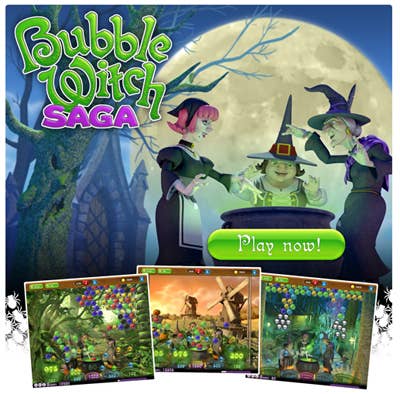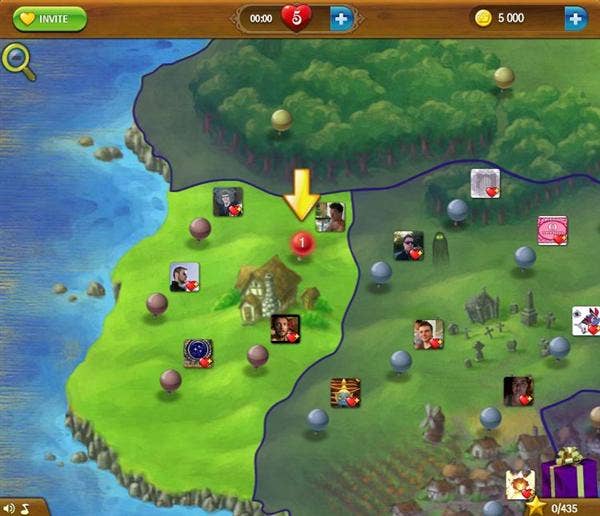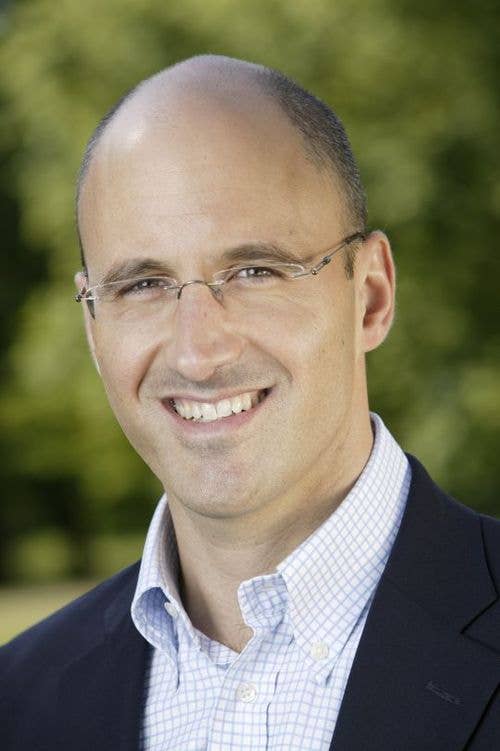King.com Interview: CEO Riccardo Zacconi
How the company has become the #2 Facebook games business in one year
Riccardo Zacconi, CEO of King.com, sat down with GamesIndustry International to discuss its rapid rise to second place on the Appdata rankings, behind Zynga. Its top game, Bubble Witch Saga, is currently the #5 game on Facebook, and overall King.com has over 11 million daily average users (DAU) on Facebook; for comparison, Zynga has about 48 million DAU and Electronic Arts has about 9.5 million DAU.
Two things. Quality takes time; you can't just speed up the process by putting more people at it. The second one is, it's a hit-driven industry. Coming back to your original question, we started the company back in 2003 on the web, developing our own games, original titles, with a format which was a social format for the time. It was a casual play where you would compete against other players in tournaments, and we would match you with three people you didn't know before. When we launched in April of last year for the first time on Facebook, we took one of the titles which was popular on King.com and we presented the same game, which you would play on King.com in a competitive way, in a non-competitive way. Instead of competing against a player you didn't know, you would play with your friends, and you would not have a winner and a loser, but you would play progression. You would play the same game on a landscape with 200 levels, and you would progress from one level to the next, by achieving a minimum score at each level.
That game unleashed its potential so we had many million players playing at the same time. The first game was a game called Bubble Saga. Then we took another game that was popular on King.com, and it again succeeded, having more than a million players playing the same game. We've launched since April of last year six titles from our portfolio of more than 160 games, and we have two titles which are larger than FarmVille, larger than CityVille, and are now among the top ten titles. We are about to launch more titles from our portfolio. Coming back to my premise, why it takes time, we are sourcing from this large portfolio of original titles we own, but at the same time we innovate by launching 18 new games every year on the web, in a rapid development cycle of basically three months for each game. The best titles are then qualified to be 'Sagafied.'
Yes. By launching so many titles per year we can innovate, because innovation requires experimentation, and experimentation also implies failure, but we fail fast and cheaply. When we invest considerably more resources with larger teams, we are pretty sure that the game play is good. We have proven the format in which we launch these games also works. We have made this 'Sagafication' of the games, where you have the progression and play with your friends, a platform. All the common features are part of the platform, not of the game. When we launch a new game, only 1 percent of the code needs to be changed for all the common features. If you think of our competitors, and just this morning it was announced that a game takes more than $10 million to develop with 100 people working for more than two years [Mark Pincus announced those numbers for Zynga's The Ville], it's a big risk to innovate. Because when you innovate and you fail with so much investment, it's a big loss. In our case, we can innovate because when we fail, we lose three months of work and three people.
"Our competitors games take more than $10 million to develop with 100 people working for more than two years"
Riccardo Zacconi
I think it's two things. If you think of the industry, it's the broader industry of entertainment. What is key in entertainment? It's to have new things. If you propose always the same series, after a while people will actually be pretty tired of it. So you need to innovate. The audience is the same audience, because the audience who plays Ville games, the majority of the audience, is actually female. Sixty percent plus of the players of FarmVille and CityVille are actually female. Our games are appealing to this audience but are bringing in suddenly more color, more variety of gameplay. It's not about resource management, where you have to wait and click, etc. It's bringing in a more challenging gameplay in some ways. You have puzzle games, you have switcher games, you have mah jongg, you have more genres of casual games, which is very broad.
An arcade game is easy to learn, and you can stop anytime because the gameplay takes between one to three minutes. If you're a housewife or at home, and you're preparing lunch, or you have a kid, you need to stop, you can't just continue. It's easy to learn, it's a snackable format in terms of how long it takes you to play the game. You can however also play for a very long time. The third quality, which is very important, it's easy to go back. When you go back on a resource management game, your crops have withered. Here, you continue from where you stopped last time.

Mobile is the next big strategic area for us, principally because we see a huge opportunity there. With casual games, if you think of snackable consumption, mobile is the ideal platform. It adapts very well to any screen size, and it doesn't require a lot of data consumption versus hardcore games, which I think is also key for mobile. We believe also in differentiation, and how we want to differentiate is to have fully synchronized game play, so that we have a truly seamless experience. We think that the player should focus on the game , and when we launch the game we want this game to be available everywhere. If you put the hat on of the player, he wants to be able to play on his computer, but when he goes on his iPad or iPhone he wants to be able to continue playing from where he stopped. If I buy some items which help me in the gameplay on my computer, I want to have them also on my iPhone and my tablet. That's what we're working on.
We always work in the native language; on Facebook we work in Flash, on iPhone and iPad we work in the native language, and Android the same thing. We actually did an experiment with HTML 5; Pyramid Saga is in HTML 5, so you can play it from your browser. What we found, and we worked very closely with Google, their recommendation was it's actually better to native language when you develop for a mobile device.
"Mobile is the next big strategic area for us"
Riccardo Zacconi
It's actually OK, but in terms of rendering, the crisp colors and graphics, and the sound, I think it's still better with native, and we want to have the best possible experience. Pyramid Saga is playable today, but the experience in native is going to be much better.
It is. We've worked a long time on it, and we have integrated distribution on our platform, which means that every new game that we launch will have all the features and all the technical solution available immediately. All the games are attached to the same platform. You do the work once, and well, and any improvement is available immediately to the next game, which has the advantage of speed, quality - because you don't need to redo the code - and thirdly and most importantly, knowledge management. Often it's difficult to make sure that what you learn here is actually transferred as knowledge to the next team, especially when we work across several locations. In our case, knowledge management is embedded in the code.

In our case, it's much easier. We are coming from the street, I like to say, because on the web it was pretty much the street. Very competitive, and we had more than 60 different payment solutions adapted to every country. For example, if you didn't have LSV in Germany, which is basically a bank transfer, you would not monetize. Very few people have a credit card in Germany; the same thing also applies in Italy or Spain. So we had local solutions covering all the different billing providers. Facebook is very easy; you integrate with Facebook and they do all the work. Apple, the same; Android, slightly different.
I am super excited. For me the biggest revolution is actually tablets. I think mobile is a huge audience of course, but I think tablets are still at the beginning, especially with the price points of tablets going down. It will open up a new audience, which is anyone who actually plays or surfs from home. I think the home user is far away from having seen what is going to happen.
Absolutely, we're in the middle of gamification, games are everywhere. That's why a seamless experience is so important.
"For me the biggest revolution is actually tablets"
Riccardo Zacconi
On King.com, we have games which are real mutliplayer, and on Facebook we are experimenting with it. I think when you are talking about TV play, you'd want to play with someone who is in the same room.
You have basically everyone in the US, in other countries I think there is a lot of growth. In the U.S. I think it's becoming more cyclical together with the weather; more players in the summer season. For us there's still plenty of growth.
I think Asia is a natural place for regional extension. At this moment in time we are focused on Europe, the US, North America and South America, but next on the geographic expansion is Japan, and we're also looking at Korea. If you think of the game genres these games are perfectly suited for them. Most casual games have their origin in the '70's in Japan. They were advanced in feature phones, but feature phones didn't allow you to play much more than the card collection games or avatar games. Now with smartphones really taking off in Japan, I believe we will see new genres being popular there.
You see what we do on King.com. On King.com every month we introduce a new game. Players are waiting for this new game, and they are trying it immediately. Good games stay up, less good games, they vanish. On Facebook we are bringing in something new. It's tougher for other companies which don't have a back catalog of 160 games. Seven of the top ten games have been developed in the last 12 months.
I cannot comment on the monetization for competitive reasons. What I can say is that we have three models of monetization. If you think of a pyramid, the base of the pyramid is most of our players, who are not willing to pay for play. We monetize those through advertising. The second layer are players who want to continue playing without waiting or without having to invite their friends or without having to watch an ad. Those players actually buy lives, they buy virtual items, charms, which enable them to enhance their game play, like the charm of precision which allows you to aim, or the charm of foresight, which allows you to scroll the screen upwards.
The top of the pyramid are the heavy players, who play many hours and are really good at the game. They want an additional challenge, and those players are invited then to play in competitive tournaments. At the center of all these three models you have the same game. The combination of those three game plays allows us to grow in a very profitable way. We've been profitable since January of 2005; we wnet from 110 employees before we launched on Facebook to 240, I believe. We are growing very fast; we just opened up new offices in Barcelona, in London, in Bucharest, in Poland, a second office in Sweden, all focused on development. We opened an office here in San Francisco. It's very profitable.
Yes, and launching more games on social, that is actually the biggest factor. That is why we bought a company for mobile, that's why we opened up an office in Bucharest, that's entirely focused on mobile. It's all about talent. We're not acquiring IP; we have plenty of IP, we're acquiring talent. That's the reason we opened up offices in several locations, because the talent pool in Stockholm is a fantastically skilled talent pool, but it's a small talent pool. That's why we opened up a second office in Malmo, because there are two technical universities there that are very good. We opened up an office in Barcelona, for the pure reason that there is a fantastic talent pool there; we opened up the office last week, we now have 18 people there. We opened up an office in Bucharest because we found fantastic people who before were working at EA in mobile.
The platform approach allows us to work with offices around the world and assure the same level of quality. We say this game has launched on King.com, is a good game, is a proven game; so here is the gameplay, here is the artwork, please develop additional levels of this game. Regarding the common features, like from the login to the map, please integrate with our platform. We have a standardized process where we have a team which is supporting the teams in other countries.
Yes, for instance with Bubble Witch Saga we started with 70 levels and we have now more than 300 levels.
On Facebook, we introduced recently and we are testing competitions for charms. You compete against others and what you win is a charm that gives you powers in the game, like the charm of precision that lets you aim better.
"If you don't keep experimenting you are dead"
Riccardo Zacconi
Video ads; they have a very high eCPM, and it's part of a positive user experience. When you finish your lives, you can either invite your friends, or buy new lives, or you can watch a video ad. The advertiser is actually sponsoring your gameplay. We're working with Nestle, and T-Mobile - big companies.
We are very focused on our audience, which is a female audience. We are focused on casual games, because we feel these games have a long way to go, because it's a format which can be played across any device. We experiment a lot, but casual has a lot of different categories like puzzle games, word games, hidden object games, and so on. We are also experimenting with formats outside of the Saga format. If you don't keep experimenting you are dead. Coming back to the blue ocean strategy, which seems to be a favorite buzzword here at the conference, there are two key components of a blue ocean strategy. The first one is you have to be different from others; it's differentiation. The second component for a sustainable competitive advantage is low cost. If you have a cost advantage and you are differentiated long term you have a sustainable business.
Exactly. And you will not. That's why if you look in industry those who have this strategy are not taking many risks.
Yes. I think that the industry on Facebook has been very much moving along those lines, and we are disrupting this industry.
I think as a startup you have to take risks, and I think it's good. I think the game is everything, and as an entrepreneur you often have all eggs in one basket. I would definitely encourage it. The challenge, however, is to have repeated successes. Many companies, which are very successful with one game, and then fade in launching the next game. That has been one of the difficult things in this industry which is a hit-driven industry where the gameplay is most important in succeeding.

